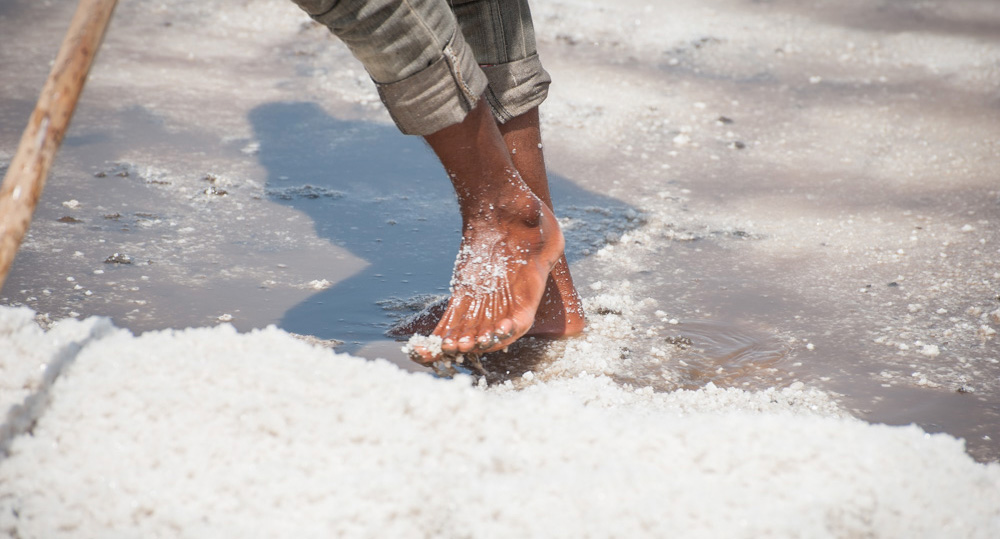Salt Pan Farmers in Kutch Rann, The Agaria
I was riding a bicycle in Gujarat and decided to take around Gujarat from coastal side to visit Kutch and ruins of Indus valley near Dholavira. I started my ride from where I had spent my golden days of childhood. Rajkot a known industrial city of Saurashtra, where Mt. Gandhi did his schooling. My aim was to ride on the coastal side form of Gujarat visiting Geer forest and from Somnath, I took the coastal road.

My main aim was to spend some quality time with workers, to know more about them how they do salt farming in such a tough environment. As usual, the ride started with meeting childhood friends and again got remark “how stupid and crazy I am” but this was very much usual for me.
After visiting a couple of know places, I came to a place which is known as the gateway of Kutch, Surajbari Bridge, when this bride did not exist, it was really a long way to get into Kutch. Actually, this bridge connects Kutch and Gujarat. There was an earlier old bridge which was built during the first war with Pakistan in 1965 and a new one opened in 2001. As soon as you cross this Surajbari bridge which is built over the creek you enter into heavy wind zone and being windy place government has a big setup for wind energy through windmills.

This creek is also known for salt farming and salt framers known as “agaria”, again cycle gave me a great advantage and could mix-up with them very easily.
Agaria – Salt Farmers in Rann of Kutch “Agaria” – Story of them is really not new, it has a long way to come to this stage with little change in lifestyle. Since 1872, when salt production began in the Little Rann of Kutch. They labour hard in the harsh sun and briny waters with no protective gear, earning very little for each kg of salt produced.

An estimated 50,000 people (agairas) – salt farmers, their families and dependents – are engaged in salt farming, a season for salt farming is very little; it starts from September to March in the Little Rann, many of them living for eight months in conditions comparable to medieval times.
Salt production in this area has a history of 5000 years old and when British rules came in India they started regulating everything. Kharaghoda, a remote village; located in Surendranagar district, converted into a salt hub. Historical sources indicate that around the middle of the 19th century, British India derived 10% of its revenues from the monopoly of salt. The salt pan workers from Kharaghoda and other smaller villages on the periphery of the Little Rann have been the unsung beasts of burden of the salt industry since then.

The salt workers are really poor in terms of everything such as little or no education, fail to comprehend such grand development initiatives. All they have known is a poverty-stricken existence along the coast. Their already difficult life has been made even tougher by the deadly natural disasters such as the cyclones, droughts, and on top of it a deadly earthquake. When the governments of the day failed to help them substantially.
After spending a good time with them they really became friendly and told me with was really unconsciously and stated when he was pulling salt from one field to other and said: “What good are these grand promises when the governments cannot provide us drinking water, hospitals and schools. If anything, the government of the day should protect us from outside companies coming here to destroy our livelihood”. But unfortunately, it’s not easy for them to live in such hard conditions.

In generally salt farmers have to work and spent most of their life in agar (salt farmers) only, they make small makeshift huts to sleep, keep some of their luggage and to set their local kitchen. I was told by a slat worker that, even they can’t go to a hospital for childbirth and new life comes in this world behind some dry salt hills. It is also said that after the death of any agaria it’s really hard to burn bones as salt effects it so hard and they burn by kerosene to put fire on it.
Producing salt is really not an easy process, they get saltwater from a creek and start to dry in a small pond and keep shifting it from one to other and finally after 15-18 days for shift prices of such high-density salty water converts into salt and for such hard work they get very little money.
A large number of salt pan workers, harnessing salt in the Little Rann of Kutch area are fighting a battle for their survival in the land where Mahatma Gandhi had launched his salt movement, as they have been asked not to enter the area that has been declared as wild ass sanctuary.
The recent orders of the state forest department could ruin the economy of 107 villages which surround the Little Rann of Kutch and is entirely dependent on the salt. The Little Rann has been a traditional salt-producing area as it produces 21 per cent of total salt production in India.
State forest officials have sent notices to most of the salt workers in November 2006, directing them to stop their traditional vocation and vacate the sanctuary area or face three years imprisonment and a fine of Rs 25,000. The Little Rann, which has become a bone of contention between humans and animal, was declared a wild ass sanctuary in 1978 and has a population of 3,600+ wild ass, which is an endangered species. The salt pan workers, known as ‘agarias,’ have demanded that they are allowed to continue with their traditional occupation which their forefathers have been doing for the last 600 years. Listening to them was really heart touching for me and really didn’t had an idea how much time I spent with them, I was offered a simple lunch by them and even they were ready to prepare some vegetarian food if I’m vegetarian; generally, when I cycle long distance I carry some fruits and when I offered fruits; they denied to have them I asked them why you are not taking them? Answer from these poor people
“You are on a yatra and you might need them in a day as this is dry land and you don’t get food anywhere in this deserted area” and you are a guest to us we cant take from you.
And I realised this is what we call humanity and care about known traveller whom the met for a few hours and make you their guest. Here are visuals which really heart touching for all of us and I’m sure every time when we use salt we must remember their hard work on salt filed.



I wanted to know a little more about their culture.
How do they celebrate their festivals, ceremonies and rituals?
and how is it different from others?
They are Gujarati only and celebrate the same festivals.
Is there a way one could help a salt family with occasional small, useful gifts? Could one be sure they would receive them?
Hello David, Thanks for reading the article and comment, what kind do you want to do to them?
Cash, of course, would be best but how could I be sure that they would receive it? It probably wouldn’t take very much money very often to be very helpful.
Okay, I will be reaching there in few weeks once again and can update you how you can help them. I already sent you email please check it.
Yes, I have been receiving your emails and my question remains; how to make sure that the help is actually received by those who need it. It is well know that nearly all aid of any sort never reaches the intended recipient . It’s intercepted by a host of intermediaries who use it for their own purposes. This cutting-off of help to those on the bottom has been going on for decades with no apparent solution, and in thinking about it I realize that nothing can really be done about it. The problem is intractable and I’m now sorry I raised the issue in the first place.
I’m not an intermediate person who takes the money and ask/take a commission. I also informed that I will be there in a few weeks and should ask them how to achieve this directly. The only way you should go yourself and figure it out how to help.
Thank you so much.
I guess that we are not understanding each other. I was simply asking for considered input and advice. It had never crossed my mind that you were anything other than an honest, caring person. Sorry if I conveyed a counter impression.
I won’t be traveling to the region so cannot help in person. And since there appears to be no other sure way of helping I’ll be bowing out. I appreciate your correspondence and your comments. Thank you, Manish.